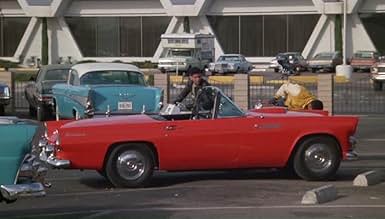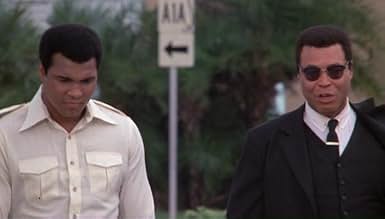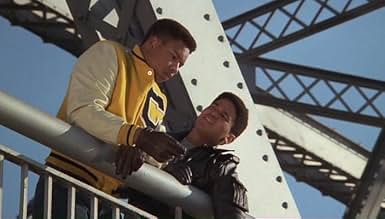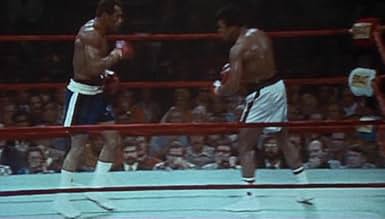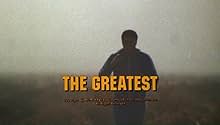IMDb रेटिंग
5.9/10
1.7 हज़ार
आपकी रेटिंग
अपनी भाषा में प्लॉट जोड़ेंMuhammad Ali plays himself in a reconstruction of the events that brought him to fame.Muhammad Ali plays himself in a reconstruction of the events that brought him to fame.Muhammad Ali plays himself in a reconstruction of the events that brought him to fame.
- पुरस्कार
- कुल 2 जीत
Teddy Wilson
- John the Gardener
- (as Theodore R. Wilson)
Chip McAllister
- Cassius Clay - Aged 18
- (as Phillip 'Chip' McAllister)
Drew Bundini Brown
- Drew 'Bundini' Brown
- (as Drew 'Bundini' Brown)
फ़ीचर्ड समीक्षाएं
I loved Ali the fighter. I was his biggest fan. With that said, Muhammad wasn't very good in this film; playing himself! The only good thing about this movie are the real films of some of Ali's greatest boxing matches. The entire cast comes across as cartoonish, stereotyped, wooden and dull. Even Ali overplays himself and plays himself very badly. Forget this film and watch Ali's real boxing matches on dvd instead.
Ali plays himself impressively in this biography of his remarkable boxing career. The greatest commands the screen alongside such actors as Robert Duval, Ernest Borgnine and James Earl Jones. The film is not as powerful, moving or exciting as it could have been and so is a slightly disappointing dramatization of a legendary boxing story. But, of course, just to see Ali doing what he does best (entertaining out of the ring as well as in) is a must for most. So, see it.
9?¬9?est (1977) was a bio-pic that starred Muhammed Ali as himself. This film was based upon a biography that was titled the same as the movie. Who else could portray the "Greatest of All Time" other than the man himself. The movie follows Ali from when he was known as Cassius Clay, winning the boxing gold medal, winning the World's Heavyweight Boxing title from Sonny Liston, refusing to be inducted into the military because of his deep religious beliefs and so on. How far does the film go into his life? You'll have to find out when you watch THE GREATEST!!
I felt that Ali did a good job of portraying himself. I can't see any other person being able of doing the job. ALI, the movie just didn't do the man justice. It was filled with a lot of flaws and omissions. THE GREATEST may not be the best movie around, but if you want to see the man in all of his glory then you have to watch this movie. It was a real hoot to see Ali running his famous "Louisville Lip" and it was also nice to see Ali's inner circle of friends and confidants live and up close. I enjoyed this film much more than the overrated ALI.
Recommended for boxing fans.
I felt that Ali did a good job of portraying himself. I can't see any other person being able of doing the job. ALI, the movie just didn't do the man justice. It was filled with a lot of flaws and omissions. THE GREATEST may not be the best movie around, but if you want to see the man in all of his glory then you have to watch this movie. It was a real hoot to see Ali running his famous "Louisville Lip" and it was also nice to see Ali's inner circle of friends and confidants live and up close. I enjoyed this film much more than the overrated ALI.
Recommended for boxing fans.
The original (and nominal) director here, Tom Gries, died of a heart attack while the film was still in production; somewhat perversely, Monte Hellman (who usually had to struggle to set-up his own personal projects) seemed like the go-to-guy in similar situations – since he would be assigned similar 'doctoring' duties on AVALANCHE EXPRESS (1979), whose own viewing preceded this one! While it was most probably green-lit in the wake of the boxing sleeper hit (and surprise Oscar triumph) ROCKY (1976), earlier in the decade another film on a black champ within this particular sporting field had emerged i.e. THE GREAT WHITE HOPE (1970) – in which James Earl Jones had been Oscar-nominated for his turn as Jack Johnson and who, here, turns up briefly as yet another controversial historical figure, Malcolm X (himself the subject of a 1992 film, where he would be interpreted by Oscar contender Denzel Washington).
Anyway, it was a rarity to have the protagonist of a biopic played by the man himself; legendary Muhammad Ali – formerly known as Cassius Clay – 'performs' adequately enough under the circumstances (though some disparagingly opined that he was unconvincing!), so much so that he would later star in the made-for-TV American Civil War epic FREEDOM ROAD (1979). For the record, his life-story would also be treated in a number of documentaries, such as a.k.a. CASSIUS CLAY (1970) and the Oscar-winning WHEN WE WERE KINGS (1996) – both of which I own but have yet to check out – as well as Michael Mann's more thorough feature ALI (2001; for which star Will Smith would also be up for a Best Actor Oscar). Incidentally, the name-change was from Clay to Ali occurred when he changed his faith from Christianity (rejecting it for being "the white man's religion 'mandating' that the black man suffer while on Earth and reap his rewards in the afterlife"!) to Muslim (the boxer's association with the revolutionary Malcolm X would be frowned upon by his promoters, while Ali's pacifist views would land him in trouble with the authorities when he refused to be drafted in the Vietnam War, whereupon he was stripped of his titles!).
Thankfully, the script (by sports authority Ring Lardner Jr. and an uncredited Bill Gunn, perhaps best-known for his radical take on the vampire theme with GANJA & HESS {1973}) does not whitewash its subjects, depicting Ali as misogynistic (liberally seducing white women and dominating those of his own color) and brash (openly aggravating his opponents in order to throw them off-balance) and Malcolm himself as delusional. The heavyweight bouts themselves are presented briefly via stock footage, with more time allotted to the 1974 "Rumble In The Jungle" with Ali making a spectacular comeback facing George Foreman (actually exclusively dealt with in the afore-mentioned WHEN WE WERE KINGS – by which time the protagonist would have become afflicted with Parkinson's Disease, though he did turn up unannounced at the awards ceremony!) and which ends THE GREATEST itself on a high note. Such powerful moments are intermittently felt throughout, but the end result does not really prove the compelling portrayal that was clearly intended!
In fact, among its deficiencies, one has to include the movie's soundtrack – composed of equal parts sappy songs by George Benson (notably "The Greatest Love Of All") and a pulsating score (during the ROCKY-type training sessions) that are very evocative of its era, that is to say, feel dated at this juncture! Nor is the film helped in any noticeable way by the star-studded supporting cast – highlighting Ernest Borgnine (as Ali's trainer), John Marley (his doctor), Robert Duvall (the afore-mentioned flustered promoter), Ben Johnson (as an early supporter), a thinned-down Paul Winfield (as his defence counsel) and Roger E. Mosley (as Sonny Liston, the heavyweight champ he first lost to and then triumphed over).
Anyway, it was a rarity to have the protagonist of a biopic played by the man himself; legendary Muhammad Ali – formerly known as Cassius Clay – 'performs' adequately enough under the circumstances (though some disparagingly opined that he was unconvincing!), so much so that he would later star in the made-for-TV American Civil War epic FREEDOM ROAD (1979). For the record, his life-story would also be treated in a number of documentaries, such as a.k.a. CASSIUS CLAY (1970) and the Oscar-winning WHEN WE WERE KINGS (1996) – both of which I own but have yet to check out – as well as Michael Mann's more thorough feature ALI (2001; for which star Will Smith would also be up for a Best Actor Oscar). Incidentally, the name-change was from Clay to Ali occurred when he changed his faith from Christianity (rejecting it for being "the white man's religion 'mandating' that the black man suffer while on Earth and reap his rewards in the afterlife"!) to Muslim (the boxer's association with the revolutionary Malcolm X would be frowned upon by his promoters, while Ali's pacifist views would land him in trouble with the authorities when he refused to be drafted in the Vietnam War, whereupon he was stripped of his titles!).
Thankfully, the script (by sports authority Ring Lardner Jr. and an uncredited Bill Gunn, perhaps best-known for his radical take on the vampire theme with GANJA & HESS {1973}) does not whitewash its subjects, depicting Ali as misogynistic (liberally seducing white women and dominating those of his own color) and brash (openly aggravating his opponents in order to throw them off-balance) and Malcolm himself as delusional. The heavyweight bouts themselves are presented briefly via stock footage, with more time allotted to the 1974 "Rumble In The Jungle" with Ali making a spectacular comeback facing George Foreman (actually exclusively dealt with in the afore-mentioned WHEN WE WERE KINGS – by which time the protagonist would have become afflicted with Parkinson's Disease, though he did turn up unannounced at the awards ceremony!) and which ends THE GREATEST itself on a high note. Such powerful moments are intermittently felt throughout, but the end result does not really prove the compelling portrayal that was clearly intended!
In fact, among its deficiencies, one has to include the movie's soundtrack – composed of equal parts sappy songs by George Benson (notably "The Greatest Love Of All") and a pulsating score (during the ROCKY-type training sessions) that are very evocative of its era, that is to say, feel dated at this juncture! Nor is the film helped in any noticeable way by the star-studded supporting cast – highlighting Ernest Borgnine (as Ali's trainer), John Marley (his doctor), Robert Duvall (the afore-mentioned flustered promoter), Ben Johnson (as an early supporter), a thinned-down Paul Winfield (as his defence counsel) and Roger E. Mosley (as Sonny Liston, the heavyweight champ he first lost to and then triumphed over).
After seeing several disappointing biopics featuring Ali I have no fear in saying this is one of the better movies featuring the great man . The film is helped by a script that tells of young Clay`s struggle against prejudice and discrimanation without going overboard , and the script to its credit doesn`t concern itself with deep discussions of Ali`s psyche unlike a few movies I could mention , here the script just concentrates itself with hard facts . By a strange irony the film is less effective when Ali appears playing himself but that`s probably down to Ali having a bit too much fun reliving his past like turning up at Sonny Liston`s house at the dead of night to throw insults , but you can`t really blame Ali for enjoying himself , he was a remarkable man who had many remarkable moments in his life
You probably won`t learn anything new about Ali watching this film , but you can be certain that it`s all true
You probably won`t learn anything new about Ali watching this film , but you can be certain that it`s all true
क्या आपको पता है
- ट्रिवियाThe film's theme song, "The Greatest Love of All", which was written and recorded to be the movie's main theme, is sung by crooner George Benson and is played during the opening credits of this movie.
- गूफ़Muhammad Ali is shown fighting Joe Bugner during the montage of bouts that took place between the first Joe Frazier fight in 1971 and the first Ken Norton fight in 1973. However, the footage actually is taken from the second fight with Bugner in 1975 instead of their first fight in 1973. Not only is this out of sequence for the montage, but the second Bugner fight occurred after the Ali vs. George Foreman fight in 1974 which is the climax of the film.
- भाव
Drew 'Bundini' Brown: Float like a butterfly and sting like a bee. You can't hit what you can't see.
- साउंडट्रैकThe Greatest Love of All
(main title song)
Sung by George Benson
Music by Michael Masser
Lyrics by Linda Creed
टॉप पसंद
रेटिंग देने के लिए साइन-इन करें और वैयक्तिकृत सुझावों के लिए वॉचलिस्ट करें
- How long is The Greatest?Alexa द्वारा संचालित
विवरण
- रिलीज़ की तारीख़
- कंट्री ऑफ़ ओरिजिन
- आधिकारिक साइट
- भाषा
- इस रूप में भी जाना जाता है
- El más grande
- फ़िल्माने की जगहें
- उत्पादन कंपनियां
- IMDbPro पर और कंपनी क्रेडिट देखें
बॉक्स ऑफ़िस
- US और कनाडा में सकल
- $82,84,000
इस पेज में योगदान दें
किसी बदलाव का सुझाव दें या अनुपलब्ध कॉन्टेंट जोड़ें



